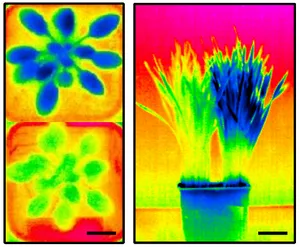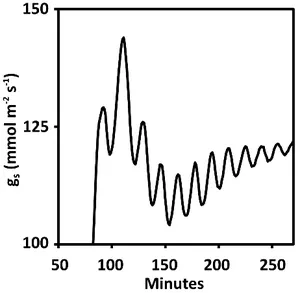Research interests Dr. Zhenyu Yang

1. Develop crops with enhanced WUE without sacrificing productivity
Background
Freshwater is one of the most vital environmental determinants of crop productivity. The availability of current and future freshwater is challenged by climate change and groundwater depletion, threatening global food security. Despite significant efforts being invested in developing water-saving crops, current research and practice indicate that breeding crops with reduced water use very often leads to trade-offs in growth and yield under non-drought conditions, which is clearly not compatible with the interests of farmers and breeders. A key unknown is whether plants are able to reduce water consumption without sacrificing growth.
Aim of the project
We explore using abscisic acid (ABA) and ABA signaling in Arabidopsis and wheat to tackle this question and aim to develop strategies to generate crops with reduced water use and enhanced WUE without sacrificing productivity.
Previous results
Our previous research has revealed that activating specific ABA signaling via ectopic expression of each of the fourteen ABA receptors driven by the cauliflower virus promoter (p35S promoter) can enhance WUE (Yang et al., 2016). Among these receptor overexpressors, RCAR6 and RCAR10 lines achieved reduced transpiration and high WUE without growth penalty. The same trait was also achieved by repressing ABA coreceptors (Yang et al., 2019) and foliar application of ABA and ABA agonists (Roeder et al., 2023) in Arabidopsis and wheat.
Research objectives
- Generate crop lines combining reduced water and enhanced WUE with uncompromised growth and productivity
- Understand the potential physiological and molecular mechanisms of how plants can sustain growth at lowered internal CO2 levels.
Main approaches
- Gas exchange analysis
- Thermal imaging
- 13C isotope analysis
- Pressure chamber technique
- Omics analysis
- Confocal microscopy

2. The regulation of stomatal aperture in response to environmental stimuli
Plants constantly face varying environmental conditions and should decide quickly to the changing environment for optimum water homeostasis. Transpiration control is the most effective strategy. The response of guard cells drives the regulation of transpiration to environmental stimuli, including sensing, signal transduction, osmoregulation, and turgor-mediated guard cell rigidity and flaccidity.
Aim of the project
Explore molecular mechanisms for stomatal response to external stimuli.
Preliminary results
Mutants that partially or entirely lose CO2 response have been identified.
Genetic variation in stomatal oscillation has been identified (Yang, 2016).
Research objectives
- Identify genes related to stomatal aperture in response to CO2 and light.
Main approaches
- Gas exchange analysis
- Thermal imaging
- Next generation-sequencing
Key publications
1. Liu, J., Schäufele, R., Christmann, A., Ahmed, M., Yang, Z. (2025): Guard-cell expression of abscisic acid receptors for engineering water-use-efficient plants without trade-offs in growth. New Phyt.
DOI: 10.1111/nph.70404
2. Bohn, L., Huang, J., Weidig, S., Yang, Z., Falter-Braun, P., Christmann, A., Heidersberger, C., Genty, B., Grill, E. (2024): Temperature sensor TWA1 required for thermotolerance in Arabidopsis. In: Nature, 629(8014):1126-1132.
DOI: 10.1038/s41586-024-07424-x
3. Roeder, J., Liu, J., Doch, I., Ruschhaupt, M., Christmann, A., Grill, E., Helmke, H., Hohmann, S., Lehr, S., Frackenpohl, J. and Yang, Z.*. (2023): Abscisic acid agonists suitable for optimizing plant water use. In: Front. Plant Sci., 13.
DOI: 10.3389/fpls.2022.1071710
4. Yang, Z., Liu, J., Poree, F., Schaeufele, R., Helmke, H., Frackenpohl, J., Lehr, S., von Koskull- Döring, P., Christmann, A., Schnyder, H., Schmidhalter, Urs., Grill, E. (2019): Abscisic acid receptors and coreceptors modulate plant water use efficiency and water productivity. In: Plant Physiol.,180:1066-1080.
DOI: 10.1104/pp.18.01238
5. Blankenagel, S., Yang, Z.*, Avramova, V., Schön, CC., Grill, E. (2018): Generating plants with improved water use efficiency. Agronomy, 8(9):194.
6. Yang, Z., Liu, J., Tischer, SV., Christmann, A., Windisch, W., Schnyder, H., Grill, E. (2016): Leveraging abscisic acid receptors for efficient water use in Arabidopsis. In: Proc Natl Acad Sci.,113:6791-6796.
Complete list of publications:
Orchid ID: https://orcid.org/0000-0003-4558-4049
Researchgate: https://www.researchgate.net/profile/Zhenyu-Yang-18
Google Scholar: https://scholar.google.de/citations?user=8RCa_9UAAAAJ&hl=de&oi=ao